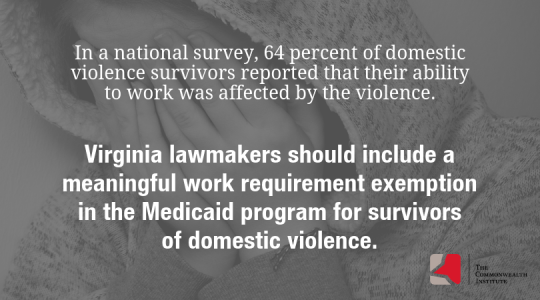November 15, 2018
Survivors of Domestic Violence Need Health Care, Not Hurdles
Survivors of domestic violence may face additional barriers to accessing Medicaid coverage if work requirement exemptions are taken away from them. The current work requirement proposal includes survivors of domestic violence as an exemption group. However, recent discussions by Virginia lawmakers drew into question the need for such an exemption. A delay of the work requirement submission in order to address legislators’ concerns may put that exemption in danger of being removed or limited.
Health care access is important for everyone. Access to quality and affordable health care is of particular importance to survivors of domestic violence.
Women who have endured domestic violence are more likely to experience a variety of long-term and acute physical and mental health needs, and are more likely to use mental health services than women with no history of partner abuse. Male survivors are more likely than men with no such history to experience frequent headaches, chronic pain, difficulty sleeping, activity limitations, and to consider their physical and mental health to be poor. As a result, survivors use health care services at a higher rate compared to those who do not have a history of domestic violence, particularly mental health services.
Survivors of domestic violence can lose employer-based coverage when they leave their abuser or lose their own job due to the abuse. Stalking or threats can occur for weeks, months, or even years after an initial report of domestic violence. A return to regular day-to-day activities including work will depend on various factors and recovery times can’t be predetermined. Screening and counseling for this type of trauma is covered for Medicaid recipients under expansion and the Affordable Care Act without additional cost-sharing, which extends a lifeline to people enduring violence.

Limiting the duration of a work requirement exemption or completely removing it could result in survivors losing crucial and affordable health care coverage during a time of immense transition. And even for those survivors who are able to obtain or maintain employment during this difficult time, the administrative burdens of reporting their work hours may be a barrier – the process of tracking whether individuals meet work requirements has been an issue in other states and has caused many working adults to lose coverage. There are many problems with work requirements in general, but failing to provide a meaningful exemption for survivors of domestic violence would have particularly awful consequences and would be a terrible oversight.
Category:
Health Care
